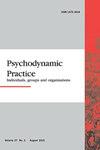动态人际治疗中的人际情感焦点(IPAF):一个复合个案研究
IF 0.4
Q4 PSYCHOLOGY, CLINICAL
引用次数: 0
摘要
动态人际治疗(Dynamic Interpersonal Therapy, DIT)是一种针对与人际问题相关的难治性抑郁症患者的手动、有时间限制的心理动力学治疗。本文考察了DIT的中心思路;一种被称为人际情感焦点(IPAF)的案例提法。IPAF是一个简短的心理动力学案例表述,是对人际威胁的问题反应,它植根于内化的客体关系。它有两个维度:人际焦点和情感焦点。人际关注是一种看待自我与他人关系的方式,它产生了一种以特定方式感知自我和他人的偏见。情感焦点是一种情绪反应,由于其唤起的行为的不灵活特征,导致人际关系问题。一个综合案例研究说明了使用IPAF来探索患者内部表征和解决可能导致他们关系问题的痛苦情绪状态的价值。然而,这也说明,对于个性组织处于边缘的DIT患者,可能需要对该方法的节奏和时机采取额外的注意。本文章由计算机程序翻译,如有差异,请以英文原文为准。
The interpersonal affective focus (IPAF) in dynamic Interpersonal Therapy (DIT): a composite case study
Dynamic Interpersonal Therapy (DIT) is a manualised, time-limited, psychodynamic therapy for patients with treatment-resistant depression linked to interpersonal problems. This paper examines the central thread of DIT; a case formulation called the interpersonal affective focus (IPAF). The IPAF is a brief psychodynamic case formulation of a problematic response to interpersonal threats that is rooted in internalised object relationships. It has two dimensions: an interpersonal focus and an affective focus. The interpersonal focus is a way of viewing the self in relation to others, which creates a bias towards perceiving the self and others in particular ways. The affective focus is an emotional reaction that contributes to interpersonal problems due to the inflexible character of the behaviours it evokes. A composite case study illustrates the value of using an IPAF to explore patients’ internal representations and work through painful emotional states that may be contributing to their relational problems. However, it also illustrates that for DIT patients with borderline aspects to their personality organisation, extra care may need to be taken with the pacing and timing of the approach.
求助全文
通过发布文献求助,成功后即可免费获取论文全文。
去求助
来源期刊

Psychodynamic Practice
PSYCHOLOGY, PSYCHOANALYSIS-
CiteScore
0.90
自引率
0.00%
发文量
41
期刊介绍:
Psychodynamic Practice is a journal of counselling, psychotherapy and consultancy and it is written for professionals in all fields who use psychodynamic thinking in their work. The journal explores the relevance of psychodynamic ideas to different occupational settings. It emphasizes setting and application as well as theory and technique and focuses on four broad areas: •Clinical practice •The understanding of group and organisational processes •The use of psychodynamic ideas and methods in different occupational settings (for example, education and training, health care, social work, pastoral care, management and consultancy) •The understanding of social, political and cultural issues
 求助内容:
求助内容: 应助结果提醒方式:
应助结果提醒方式:


